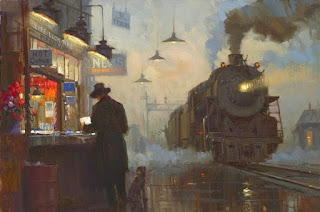Aaron served as a sergeant during the war but this was not his first taste of war. During the French and Indian wars of the 1750s, he had enlisted as a drummer at the age of 16 and already seen battle. The facts are there, but little of the experience. Until I came across this account in People's War: Original Voices of the American Revolution by Noel Rae. Wonderful evocation of the mustering of men in a small rural Connecticut town during the Lexington Alarm. Sergeant Aaron Pinney was part of this muster as was his older brother Lieutenant Abraham Pinner and his younger brother Corporal Abner Pinney. Literally, brothers in arms.
Another clergyman (though not yet ordained) who answered the call of God and his country was Daniel Barber of Simsbury, Connecticut, a town that had long been under God's special Providence. On the eve of the Indian uprising known as King Philip's War, a miraculous warning shot from an unknown source had been heard within a radius of fifty miles, sounding the alarm and saving many Protestant lives; and when, in 1768, hailstones "full the bulk of goose-eggs" fell on the town, the damage, according to a report in the local newspaper, was much less than it would have been "had not the hail fell considerably perpendicular." In his memoirs Daniel Barber recalled how on hearing the news of Bunker Hill he had joined the Simsbury militia signing up for five months. His captain was Elihu Humphrey, "a well-bred gentleman" whose "sweetness of disposition secured him the love of all good men"; his lieutenant was Andrew Hilyer, "a handsome sprightly young gentleman"; his three sergeants were Aaron Pinney, "a man of a fierce and fiery countenance"; Jacob Tuller, whose "brow was generally knit together in a forbidding frown"; and Daniel Higley, "who had been a soldier in the old French war, was of a musical turn, and his old war songs made the time pass away to very good account." The Rev. Mr. Pitkin preached a farewell sermon on the text "Play the man for your country, and for the cities of your God; and the Lord do that which seemeth him good," which was well received. "It was tender and pathetic, lively and animating. It was like martial music; while it touched the finer feelings, it roused and animated for the dreadful onset—the shout of war and the cry of victory! During the time of its delivery, abundance of tears were seen to flow, from both old and young, male as well as female.)
After the service, the soldiers mingled with their families and sweethearts,
exchanging, as for the last time, the token of their love and the best affections of the heart. In the midst of this mingling scene of sorrow, the drums beat to arms. "Soldiers, take your places!" is the word; the line of march is formed; we add one more wishful, lingering look, while many a silent tear bespeaks the real feeling of the heart.
The word is given. We begin our march with silence, downcast looks, and pensive feelings and reflections. We were now leaving our homes, our friends, and all our pleasant places behind, and which our eyes might never again behold. The most of us had not, at that time, I believe, been twenty miles from home.
After marching awhile, we began to give way to more cheerful and lively feelings. We marched about eight miles that afternoon; at night put up at James Marsh's inn. Here, for the first time, I slept as a soldier on the floor, with a cartridge box for my pillow. At that period, horse wagons being very little in use, an ox team was provided to carry our provision for the way, and a barrel of rum. Our provision was salt pork and peas. Wherever we stopped, a large kettle was hung over the fire, in which the salt meat was put without freshening, and the dry peas without soaking. Cooks and stewards were appointed who took charge of the table department. When all was ready, a stroke on the drum was the signal to begin to eat; and we were generally hungry enough to stand in need of no great urging. While passing through Connecticut, the females were very polite in lending us knives and forks; but, after entering Massachusetts, we were not allowed the like favor, without pledging money or some other kind of security—the people saying that they had lost many of their spoons by the soldiers who had gone before us. Our bread was hard bisquit, in which there was a small quantity of lime, just sufficient to make the mouth sore. They were so hard that the soldiers called them candlestick bottoms.
Now for the first time we traveled on the Lord's day, under arms, and past meeting houses in the time of public worship, with drums and fifes playing martial music; all which was calculated to afford to a New England man some doubts and reflections whether God would be as well pleased with such parade and military performance as if we had stayed home to read our Bibles, or went to meeting to hear the minister. But military discipline and the habits of a soldier soon effected a degree of relaxation in most of us.
After about nine or ten days' marching in company, with our ox team loaded with our salt pork, peas, and candlestick bottoms for bread, and the barrel of rum to cheer our spirits and wash our feet, which began to be very sore by traveling, we came to Roxbury, the place of our destination. There the place of our encampment was already marked out, and a part of our regiment on the spot. For every six soldiers there was a tent provided. The ground it covered was about six or seven feet square. This served for kitchen, parlor, and hall. The green turf, covered with a blanket, was our bed and bedstead. When we turned in for the night, we had to lie perfectly straight, like candles in a box; this was not pleasant to our hip bones and knee joints, which often in the night would wake us, and beg to turn over. Our household utensils, altogether, were an iron pot, a canteen, or wooden bottle holding two quarts, a pail, and a wooden bowl. Each had to do his own washing, and take his turn at the cookery.


























